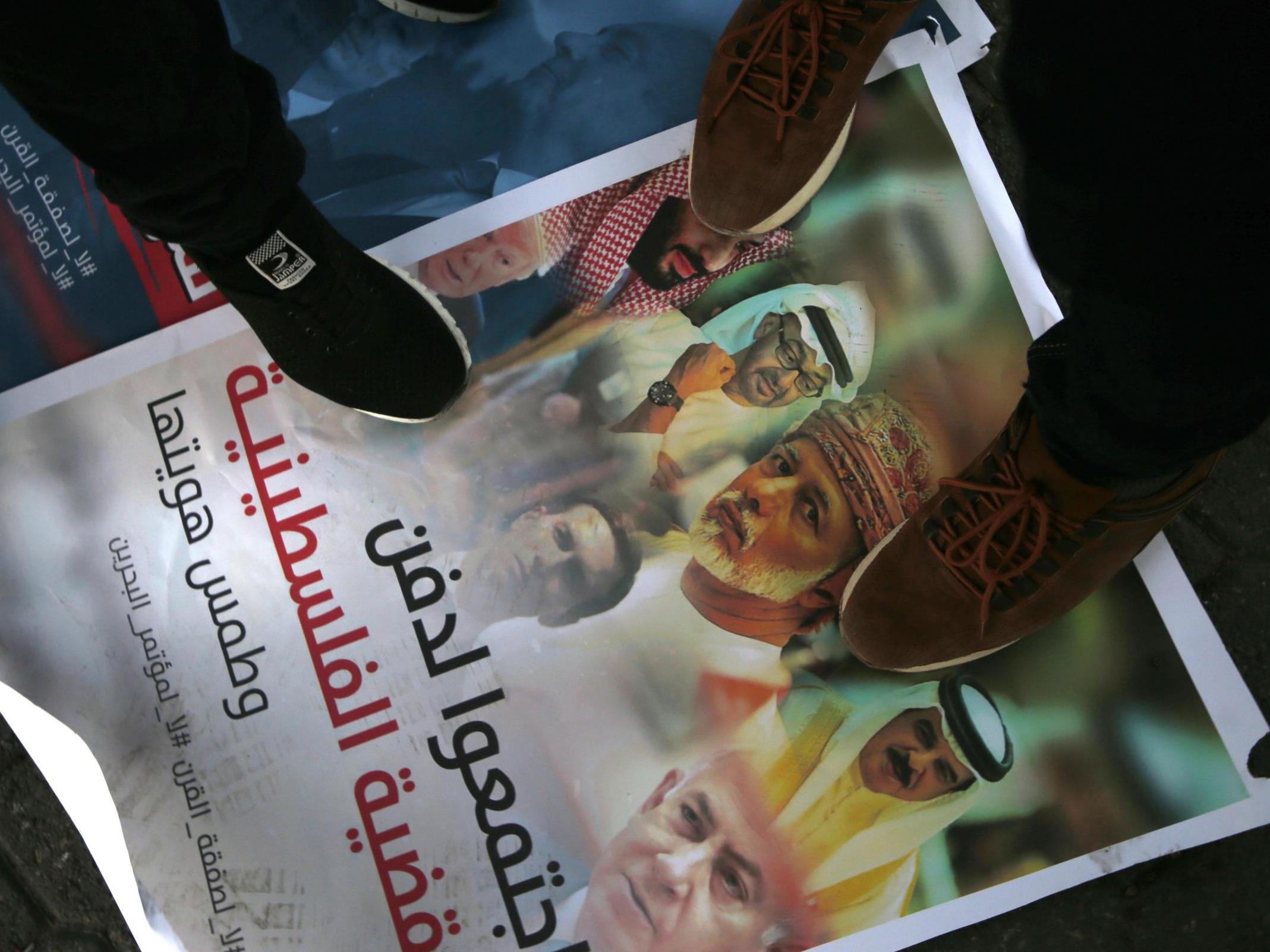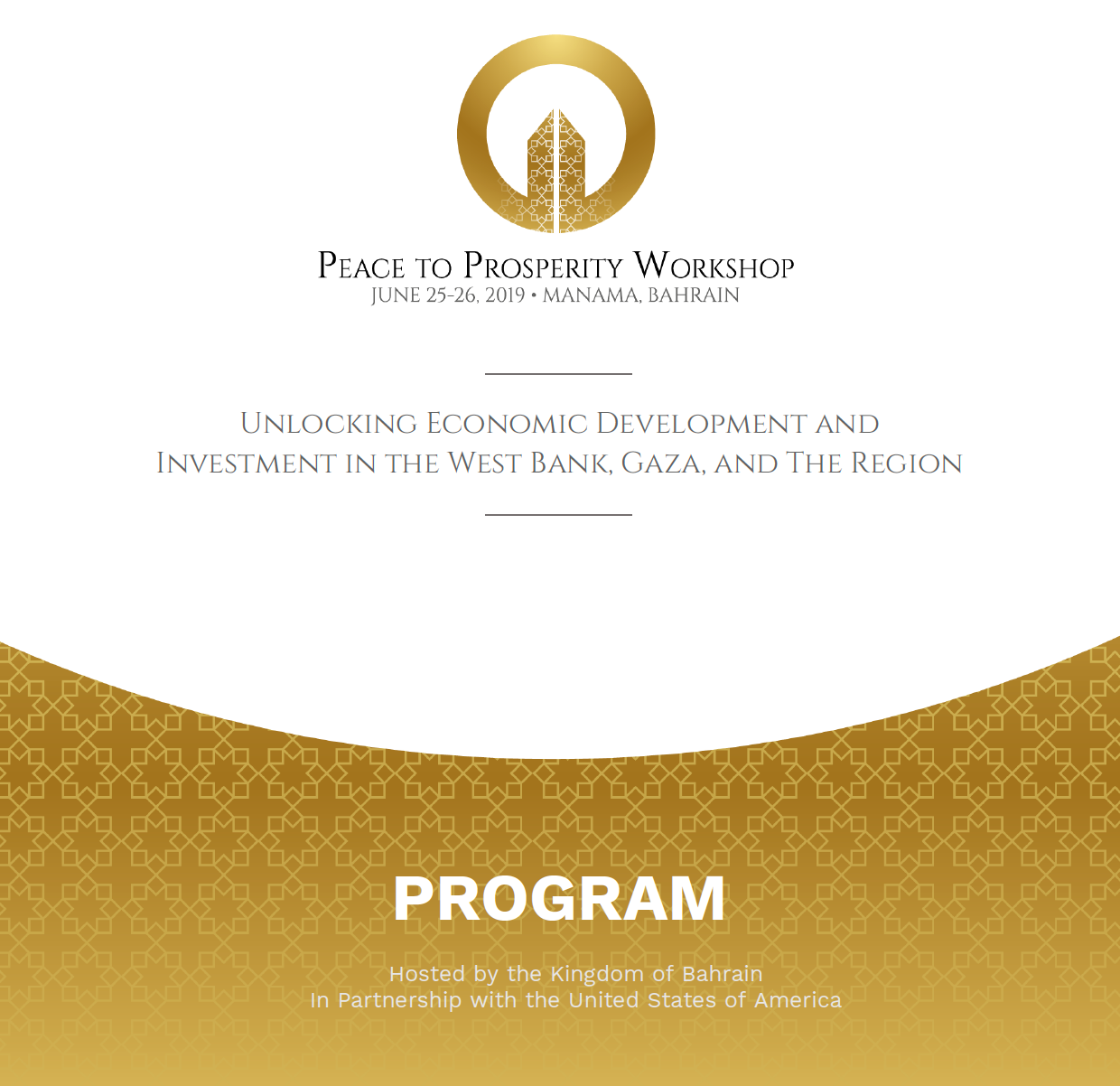Trump to unveil long-awaited peace plan at summit Israelis and Palestinians will not attend
Analysis: Controversy has marred a two-day economic workshop in Bahrain which the US hopes will ‘jump start’ Palestinian economy and build peace in region

No Israeli or Palestinian officials will be present when Donald Trump launches his long-awaited and much-touted peace plan for the region.
The second hiccup, according to sources in Washington, is that neither the Republican-dominated senate nor the Democrat-led congress have much clue what is going on.
The third is that advice from prominent Palestinian pollsters appears to have been ignored.
Despite a bumpy journey, the US president plans to plough ahead with the two-day “Peace to Prosperity workshop” in Manama, Bahrain.
There, to an audience bereft of the main actors in the conflict, American officials will launch the initial tranche of a regional peace deal that has been two-years in the making.
At the helm is Mr Trump’s son-in-law Jared Kushner who will present a 96-page document that outlines a $50bn plan to “jumpstart” the ailing Palestinian economy.

However, it seems beyond conversations between a core cadre including Jason Greenblatt, the US special envoy, and David Friedman, the US ambassador to Israel, there has been little discussion with Washington.
Senate Appropriations Committee staff were allegedly not briefed on either the conference or the plan which was initially introduced to the world’s media last week. The US congress has apparently not green-lighted any funds for it.
“Nobody in this town has been included in any of their conversations” said one person close to the matter in the American capital.
Back in the Middle East a leaked schedule of the conference offered more clues. It will star old favourites like Tony Blair and the International Monetary Fund’s chief Christine Lagarde. Representatives from the World Bank and the Gulf states will also be present.
The Palestinian leadership have boycotted the event, while the Israeli leadership were not invited.
But Palestinian businessman Ashraf Jabari is expected to speak and a number of Israeli businessmen and journalists landed in Manama on Monday night.
They will appear next to Arab political and financial figures in a country Israel has no formal diplomatic relations with.
Rabbi Marc Schneier, who was recently appointed a special adviser to King Hamad of Bahrain to work on bringing the Gulf countries closer to Israel, said this alone was an impressive achievement.
He also pointed to the fact that a Qatari representative was joining the event, despite the ongoing conflict with states like Saudi Arabia and the United Arab Emirates (UAE), whose ministers were also attending.
“This is a priority that transcends political and ideological differences in the region, it is significant,“ he told The Independent.
But aside from these accolades, the conference had an inauspicious start.
Palestinian president Mahmoud Abbas and Ismail Haniyeh, the head of Hamas, the militant group that rules Gaza, separately rejected the conference on the grounds it is not possible to fix the Palestinian economy before tackling issues like statehood, the Israeli military occupation of Palestinian lands and the question of the refugees.
Mr Abbas said on Sunday he could not accept turning “the whole cause from a political issue into an economic one”.
Mr Haniyeh urged King Hamad to cancel it. Hamas repeated: “Palestine is not for sale”.
This metaphor, of selling out, has bounced around the region in the lead up to the event, even emblazoning protest slogans at rallies in the West Bank.
From former American peace negotiators to the Palestinian leadership, critics have said that Mr Trump’s plan is encouraging the Palestinians to “barter away” their national aspirations for an injection of funds, which have yet to be raised.
A Palestinian state is not mentioned in Mr Kushner’s economic plan. Instead “Palestinian society” is mentioned five times.
Also missing are the terms occupation, refugees, Jerusalem and nationhood, Anshel Pfeffer a prominent Israeli journalist and commentator pointed out, calling it “a joke”.
Palestinians who were consulted by Mr Kushner's team, and met Mr Greenblatt at the start of the process, said their advice was ignored.

"The administration found itself as a loss at trying to understand what the Palestinians want, " said Khalil Shikaki, a renowned political scientist and pollster who told Mr Greenblatt that over 80 percent of Palestinians would not be satisfied with a plan that did not address core issues like the occupation or statehood.
"The team has no real understanding of the Palestinians or the history of the Palestinians or the history of the conflict itself," he told The Independent.
Hanan Ashrawi, a member of the executive committee of the Palestinian Liberation Organisation put it more bluntly.
“The occupation, the theft of our lands and resources, the control of our airspace, territorial borders and waters is the elephant in the room of that plan," she said.
Rather than investment, these were “the reasons Palestine had not developed its full potential”, she added.
Veteran negotiators agreed, arguing that little in Mr Kushner’s economic plan, although well-researched, was even new.
Aaron David Miller, a Distinguished Fellow at the Woodrow Wilson Center who has worked with a dozen US secretary of states on the Israeli-Palestinian conflict, said that “the notion you can front-load the economy portion is not logical or rational” and “won’t work”.
He told The Independent: “The conflict is one driven by land, by identity, by the need for security and a sense of security and competition over overlapping sacred spaces.”

Palestinian businessmen who were invited, but declined to attend the event said that the problems started well before the peace plan was unveiled.
Ibrahim Bahram, chief executive of SAFAD Engineering & Electronics in Ramallah and a board member of the Palestine Monetary Authority, told The Independent he felt Washington had been “actively working against the Palestinian economy” since Mr Trump took office.
Relations between the US and the Palestinians have been at an all-time low. In December 2017 Mr Trump parted with decades of western foreign policy by controversially recognising the contested city of Jerusalem as Israel’s capital, prompting the Palestinians to sever diplomatic ties.
A month later he began a series of devastating funding cuts impacting the Palestinians including slashing all financial support to the United Nations’ Palestinian refugee agency Unrwa.
In September the US president shut down the offices of the PLO in Washington sparking further ire. In March he recognised Israeli sovereignty over the occupied Golan Heights prompting fears he would do the same with Israeli settlements in the West Bank.
This was further compounded in June when Ambassador Friedman, a staunch supporter of the Israeli settlement enterprise, said he would endorse the partial Israeli annexation of the West Bankin an interview with The New York Times. Special Envoy Greenblatt later backed up Mr Friedman’s comments.
Just a day before the peace conference kicked off John Bolton, Mr Trump’s national security advisor, travelled to the Jordan Valley, in the Occupied West Bank with Israeli Prime Minister Benjamin Netanyahu.
He tweeted the pictures saying “I saw firsthand the strategic importance that these locations have on Israel’s national security… [Israel] cannot relinquish strategic ground along its border.”
The notion you can front-load the economy portion is not logical
The message was loud and clear, Mr Barham added: “This conference can only fail.”
The Israeli authorities have lashed out at the negativity. Mr Netanyahu said he did not understand how the Palestinians rejected the plan before knowing what it contained.

“That’s not how you move forward,” he said.
Danny Danon, Israel’s ambassador to the United Nations, called for the national suicide of the Palestinians’ “current political and cultural ethos” in an opinion piece asking “What’s wrong with Palestinian surrender?”.
Saudi minister of state for foreign affairs Adel al-Jubeir defended the Bahrain workshop saying it ”is not about buying peace”.
But Mr Miller said there was little in the plan or the conference from which anything tangible could be built.
“It is proof of life,” he concluded. “Proof there is something called a Trump administration approach to the peace process.”
Join our commenting forum
Join thought-provoking conversations, follow other Independent readers and see their replies
Comments
Bookmark popover
Removed from bookmarks